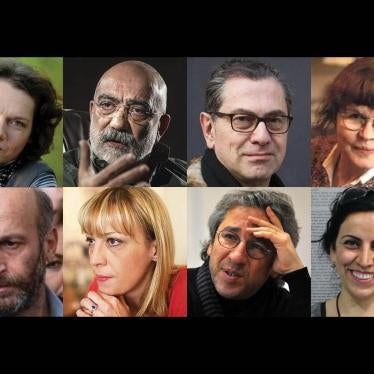U.S. President George W. Bush should secure specific human rights improvements in Uzbekistan during his summit with Uzbek President Islam Karimov, Human Rights Watch said today. The two leaders meet at the White House on March 12.
Previously a low-priority country in U.S. foreign policy, after September 11 Uzbekistan became a key ally in the campaign against terrorism. In a letter to President Bush, Human Rights Watch said that Uzbekistan's repressive policies restrict the possibility for peaceful dissent and drive opposition underground.
"In terms of human rights, Uzbekistan is barely distinguishable from its Soviet past, and President Karimov has shown himself to be an unreconstructed Soviet leader," said Elizabeth Andersen, executive director of Human Rights Watch's Europe and Central Asia division. "You have to wonder whether this kind of record makes for a trusted ally or a foreign policy burden."
The U.S. State Department human rights reports, released on Monday, acknowledged that Uzbekistan was an "authoritarian" state with a "very poor" human rights record. The government allows no genuine political opposition, engages in Soviet-style, pre-publication censorship, and has not held a single election that came close to being "free or fair" by international standards. The only alternative candidate in the 2000 presidential elections announced publicly that he voted for President Karimov.
During a January visit to Tashkent by high-level U.S. officials, President Karimov had his term in office extended until 2007 through a referendum that was roundly criticized by the international community as neither free nor fair. President Karimov has presided over the Uzbek government's campaign against those who practice Islam beyond state controls. Now in its fifth year, the campaign involves the arrest, torture, and wrongful imprisonment of thousands of people. Local officials stage Stalin-style "hate rallies," at which communities gather to upbraid perceived religious "extremists" and their families. Law enforcement agents routinely detain family members as hostages to compel wanted suspects to turn themselves over to the police.
Human Rights Watch urges the Bush administration to set the following benchmarks:
The release of religious and political prisoners;
The registration of domestic human rights groups and independent political parties;
The reform of laws used to persecute independent Muslims and political dissidents; and
Access to the country for U.N. human rights monitors.
On March 4, after six years of repeated requests, the Uzbek government registered the Independent Human Rights Organization of Uzbekistan. Human Rights Watch welcomed this move, but noted that other groups, such as the Human Rights Society of Uzbekistan, have been seeking registration for years, and that two new groups, the Human Rights Society of Uzbekistan "Ez'gulik" and a group called "The Oppressed," are also seeking registration. Human Rights Watch called on the administration to use this step as a precedent to seek progress on other benchmarks. "We'll be watching closely to see what the administration does next week in terms of sustaining pressure on the Uzbeks for human rights reform," said Andersen.
The summit comes a month after the Bush administration announced a tripling in assistance levels to Uzbekistan, in areas from civil society building to military aid. "The Bush administration has a lot of leverage with the Uzbek government," said Andersen. "There is no reason for it to give away benefits like assistance or summits without some strings attached. Next week Karimov is getting a photo op at the White House, but the real issue is, what will the people of Uzbekistan get?"








